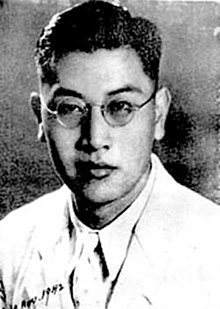
Symbolism was a late 19th-century art movement of French and Belgian origin in poetry and other arts seeking to represent absolute truths symbolically through language and metaphorical images, mainly as a reaction against naturalism and realism.

Tristan Corbière, born Édouard-Joachim Corbière, was a French poet born in Coat-Congar, Ploujean in Brittany, where he lived most of his life before dying of tuberculosis at the age of 29. He was a French poet, close to Symbolism, and a figure of the "cursed poet".

Xu Zhimo was a Chinese romantic poet and writer of modern Chinese poetry who strove to loosen Chinese poetry from its traditional forms and to reshape it under the influences of Western poetry and the vernacular Chinese language. He died in a plane crash.

Zhu Ziqing, born Zhu Zihua, was a renowned Chinese poet and essayist. Zhu studied at Peking University, and during the May Fourth Movement became one of several pioneers of modernism in China during the 1920s. Zhu was a prolific writer of both prose and poetry, but is best known for essays like "Retreating Figure", and "You. Me.". His best known work in verse is the long poem "Destruction" or Huimie.
French poetry is a category of French literature. It may include Francophone poetry composed outside France and poetry written in other languages of France.
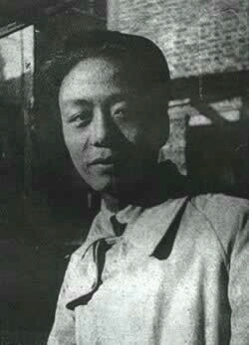
Aì Qīng, born Jiang Zhenghan and styled Jiang Haicheng, is regarded by some as one of the finest modern Chinese poets. He was known under his pen names Linbi, Ke'a and Ejia.

Liu Yichang, BBS, MH, was a Shanghai-born and Hong Kong-based writer, editor and publisher. He is considered the founder of Hong Kong's modern literature.

Mu Shiying was a Chinese writer who is best known for his modernist short stories. He was active in Shanghai in the 1930s where he contributed to journals like Les Contemporains, edited by Shi Zhecun.

The Decadent movement was a late-19th-century artistic and literary movement, centered in Western Europe, that followed an aesthetic ideology of excess and artificiality.
Shi Zhecun was a Chinese essayist, poet, short story writer, and translator in Shanghai during the 1930s. He was known for his poetry and essays, but is most known for his modernist short stories exploring the psychological conditions of Shanghai urbanites. From the 1940s onwards, he translated western novels into Chinese and worked as a scholar of classical Chinese literature.

Dai is the pinyin romanization of the Chinese surname written with the Chinese character 戴. It is romanized as Tai in Wade-Giles and in Hong Kong Government Cantonese Romanisation. Dai is the 96th most common surname in China, according to a report on the household registrations released by the Chinese Ministry of Public Security on April 24, 2007.
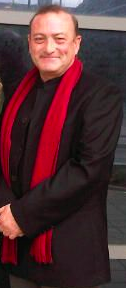
Gregory B. Lee is an academic, author, and broadcaster. Lee is Founding Professor of Chinese Studies at the University of St Andrews. He was until July 2020, Director of the French research Institute for Transtextual and Transcultural Studies based at Jean Moulin University Lyon 3. Lee was previously Chair Professor of Chinese and Transcultural Studies and Dean of the College of Liberal Arts and Social Sciences at the City University of Hong Kong. From 2007 to 2010 Lee was First Vice-President (Research) of Jean Moulin University Lyon 3. In 2010, Lee was made a Chevalier (Knight) in the French Order of Academic Palms. In 2011, he was elected Fellow of the Hong Kong Academy of the Humanities.

René Ernest Joseph Eugène Étiemble was a French essayist, scholar, novelist, and promoter of Middle Eastern and Asian cultures. Known commonly by his family name alone, Etiemble held the coveted Chair of Comparative Literature, in 1955, at the Institute of General and Comparative Literature in the pre-1968 Sorbonne University and continued in his post as a tenured Professor at the Sorbonne-Nouvelle University from 1956 to 1978. His doctoral dissertation on the Myth of Rimbaud and his many interpreters world-wide won him fame in 1952. However, one critic thinks Étiemble's derisive tone and some ill-founded conjectures about Rimbaud's later life undermine the book's credibility today. During World War II, he taught at the University of Chicago and was attached to the Office of War Information in New York in 1943. After the War, he taught French literature at the University of Alexandria, from 1944 to 1948, and thereafter at the University of Montpellier, France. He was the author of some sixty works Among his more popular works: Connaissez-vous la Chine?, Gallimard 1964, and Quarante ans de mon maoïsme (1934-1974) Gallimard 1976.

Bian Zhilin was a 20th-century Chinese poet, translator and literature researcher.
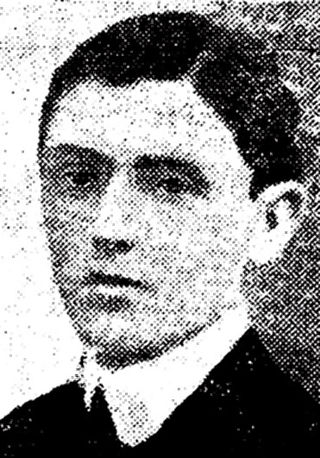
D. Iacobescu or Dumitru Iacobescu was a Romanian Symbolist poet. His literary activity only lasted about two years, between his high school graduation and his death from tuberculosis, but made him a critically acclaimed presence inside Romania's Symbolist movement. Much of Iacobescu's work remained unpublished during his lifetime, and survived as autographed notebooks. Once rediscovered and published some twenty years after his death, it brought him posthumous recognition as a writer of talent, but one whose introversion and nostalgia ran contrary to the main currents in modernism.
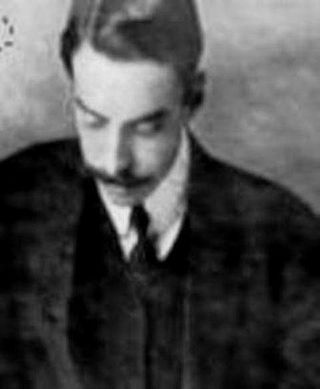
Arturo Borja Pérez was an Ecuadorian poet who was part of a group known as the "Generación decapitada". He was the first in the group to excel as a modernist poet. He did not produce a lot of poetry, but the small amount of poetry he produced showed great quality. He published twenty poems in a book titled La flauta de ónix, and six other poems were published posthumously. The group is called "decapitada", or decapitated, because all its members committed suicide at a young age.

Leung Ping-kwan, whose pen name was Yesi, was a Hong Kong poet, novelist, essayist, translator, teacher, and scholar who received the Hong Kong Medal of Honor (MH). He was an important long-time cultural figure in Hong Kong.
Shao Xunmei was a Chinese poet and publisher. He was a contributing writer for T'ien Hsia Monthly, and also was the owner of Modern Sketch. He originated from Shanghai. Jonathan Hutt wrote in Monstre Sacré: The Decadent World of Sinmay Zau that "For many, Shao was not simply inspired by the Occident but rather was of it" and that his lack of awareness of "the Chinese literary scene" distinguished him from his colleagues. On some occasions he used the name Hao Wen (浩文).
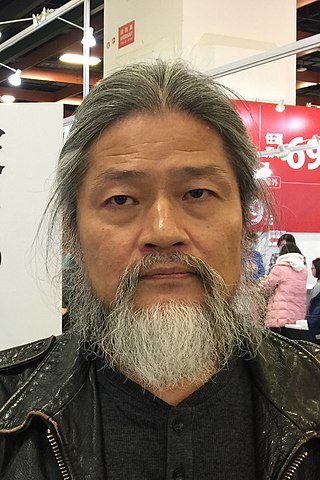
Meng Lang was a Chinese poet and dissident. He was a signatory of the human rights manifesto Charter 08 and a co-founder of the Independent Chinese PEN Center.
